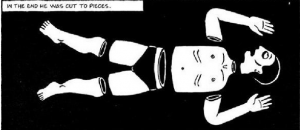Good evening!
Today, I’m going to be discussing “Persepolis”, a graphic narrative we’re currently reading in my Art Studies class. This story, by Marjane Satrapi, reflects on the childhood of her younger self “Marji” as she grows up during the Iran-Iraq war and the Iranian Revolution. Reading this story gets you emotional and scared for people you’ve never met, especially when you focus on the fact that everything is happening to a 10 year old girl. The fact that Marji was only a child while all this was happening was a heavily debated topic in my ASTU class, however one worth mentioning again.
Because Marji is so young, it brings into account the question of remembering. How is Marjane Satrapi able to remember everything that happened to her all those years ago? Does it ruin her reliability as an author? Are we supposed to read this story with a grain of salt for worry that it might not be 100% factual?
Throughout the story, the phrase “never forget” has been repeated, particularly by Marji’s beloved uncle Anoosh. Marji is told constantly to never forget what happens to her. And maybe it’s because she “never forgot” that she published a story about her childhood.
Although…There are also some instances in the story where Marji’s childlike persona is shown which reiterate the fact that she might not be completely sure of what’s going on.
This picture, on page 52 of the book, shows how Marji imagined a body cut to pieces. In actuality, it looks nothing like that! At times like this, you often question whether Marji could be trusted as a reliable narrator.
At other times in the story, something entirely different happens. On page 86 of the story, Marji is talking to one of her classmates. Her father was killed, and when she was talking to Marji, she said “I wish [my father was] alive in jail than dead and a hero. Marji reflects on this and ends that chapter by saying “Those were her exact words to me”. At times like this in the story, you understand that these flashbulb memories for her were so vivid, even all these years later.
While some memories became fuzzy, or were depicted incorrectly based on Marji’s age, the story as a whole had to have a certain element of truth to it.
It’s my belief that if something is extremely powerful or extremely important, it takes a lot to forget it. For example, I probably won’t be able to tell you what I ate for breakfast yesterday morning, however; I can easily and almost exactly retell the story of my parent’s divorce, or the car accident that happened when I was 13. Both those things happened much before the cereal/eggs/waffle I had for breakfast, however because those incidents were so important and life changing, it’s much easier for me to remember.
Nowhere in the story does Marji talk about her breakfast cereals, or what her dad was wearing. What does make it on the pages, however, are the important bits of her childhood; her Uncle Anoosh, and her trip with her parents, etc.
The process of remembering is difficult, however the process of forgetting is entirely different. How does one forget the fact that their uncle was executed?
We, as readers, have to trust both Marji, and Marjane Satrapi. We can, of course, question the bits of the story that don’t make sense, or seem out of place, but because we were never there, and because this is NOT a story of our childhood, we can’t claim “bullshit” to it.
This story is a depiction of how Marjane Satrapi remembers her childhood. It may not be entirely accurate, and it may not be completely factual, but it’s all we’ve got, so we have to believe it.
